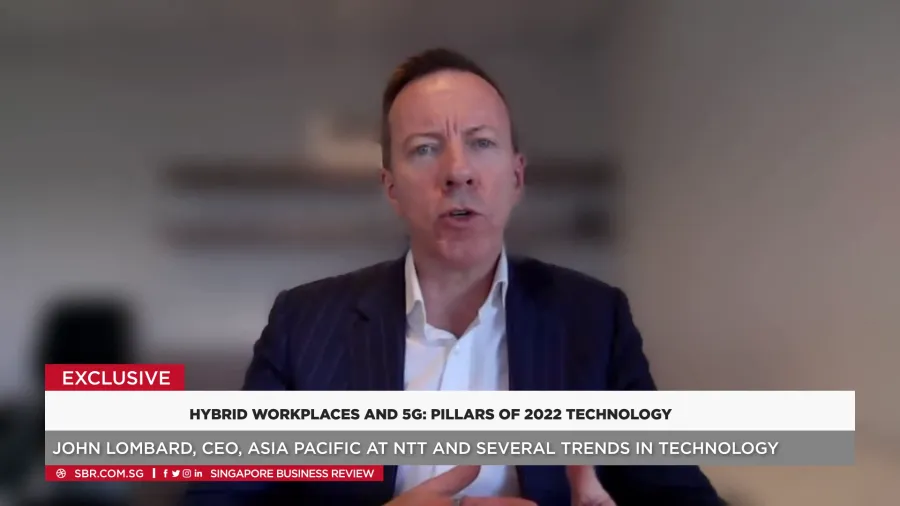
Time for businesses to go beyond WiFi and connect to Private 5G
A private 5G network can provide coverage in spaces with metal obstructions, unlike Wifi.
When businesses rely on WiFi, they are at risk of not being able to make fast and accurate decisions in critical situations given its higher latency, meaning data is transferred and received slower than other types of connection. This risk can be eliminated if companies adopt a private 5G connection.
According to John Lombard, CEO, Asia Pacific, NTT Ltd., a private 5G network allows for loads of information or data from different IoT devices to be "collected at the edge" or be processed in real-time—a feature which they said a WiFi network is "not cut" to do.
"It's ultra-high bandwidth, super-low latency, and really ensuring that decisions can be made at the edge in real-time," Lombard told Singapore Business Review.
Given that a private 5G network allows for real-time processing of data and thus faster decision-making, adopting such technology can make "any organisation more competitive and invite multiple opportunities to their business," said Lombard.
"The success and savings derived from these benefits will then ripple out to the rest of the organisation, all the way to the customer," Lombard added.
Another feature of a private 5G which is sought after by businesses is network security, which seven in 10 executives surveyed by research and insight provider, Economist Impact, said is not being provided by current connectivity and communications platforms.
Economist Impact added that a Private 5G network can also provide “coverage in strategic locations, both indoors or outdoors, such as at manufacturing plants or ports” as well as “spaces with metal obstructions.”
“In contrast with relying on public mobile networks, access is limited to authorised devices, which not only allows for improved security standards but also limits network saturation, benefitting performance and reliability,” added the company.
Reaping the benefits
For companies to reap the benefits of a Private 5G network, Lombard said they should undergo a mindset shift and be really "eager" to adopt new solutions.
Lombard cited that several companies are still adamant to adopt a private 5G network given challenges such as infrastructure complexity and lack of technical skills and expertise available to deploy the technology.
For 44% of businesses, the main challenge in implementing a private 5G network is how to integrate it with their legacy systems and networks.
These barriers, however, can easily be overcome by using system integration services when engaging with suppliers and "by outsourcing to a full suite service provider like NTT to implement and manage solutions,” according to Lombard.
According to Economist Impact, businesses also prefer outsourcing a private network from a managed service provider.
NTT has a private 5G network-as-a-service platform which enables businesses to build their own 5G network with full control and data ownership across large coverage areas.
Its global connectivity solution also includes SIM and eSIM support, carrier management and a global service delivery platform.
"We easily yet securely integrate private 5G into corporate networks and scale businesses with Network-as-a-Service and Device-as-a-Service capabilities with secure access to private apps using zero-trust network access and a Secure Access Service Edge framework," Lombard said, adding that these solutions will be needed by companies if they wish to provide their workforce with a safe and reliable network.
Private 5G in different industries
To better illustrate how Private 5G works, Lombard shared how it helps companies in the manufacturing/automotive, healthcare, energy, and retail, which were amongst the most inclined industries to adopt the technology as per Economist Impact's report.
In the manufacturing/automotive industry, what a private 5G network provides is effective communication between humans and machines.
"In an industry that relies on precise control and data prioritisation, businesses need a network that delivers and supports both connected and autonomous technologies," Lombard said.
Amongst scenarios where a private 5G would be applicable include augmented reality driving experience, cloud-based control of autonomous transport systems, advanced driver-assistance and monitoring systems, etc.
In the energy industry, Lombard said private 5G is "particularly useful" for functions which require low latency networks such as monitoring and managing field devices remotely, and automated routing of power/energy.
A private 5G is not only for complex scenarios such as those in the manufacturing and energy industries.
According to Lombard, it can also help in simple situations such as ensuring a secure exchange of patient's details, medical history, and test results within a hospital or making the exchange of payments between a seller and consumer faster.
With these opportunities which private 5G networks provide, Lombard believes the adoption of the technology will rise. True enough, over 51% of firms surveyed by Economist Impact said they plan to deploy the network within six to 24 months, whilst 94% believe that it will become a critical part of their operations in the next five years
“Today, as network perimeters expand, the security capabilities of older connectivity technologies, such as Wi-Fi, are not always optimal. Business leaders need to implement connectivity solutions with improved data privacy, security and faster connection speeds if they’re to provide their workforce with a safe and reliable network,” Lombard said.



















 Advertise
Advertise








